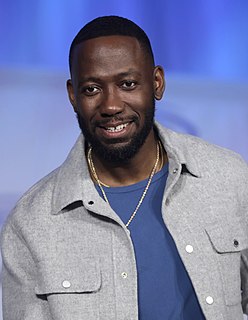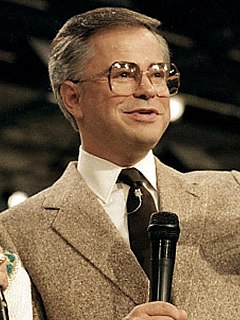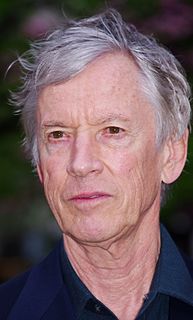A Quote by Joel Osteen
Back in Bible days, there were these famous schools of the prophets, but some of the ones Jesus chose didn't come through that route - and not to say that they weren't good, but I'm comfortable.
Related Quotes
Many of the prophets of Jesus's time were thought to just be mad men, just sort of crazy people who were claiming to channel the divine. Perhaps that means we should be a little less judgmental of some of our own crazies talking about God on the corner. They might actually have found a pretty comfortable place in Jesus's time.
In the Bible and Holy Qur'an, God shows us through the life of His prophets and messengers that none of them came into the world to do their work without severe opposition against them. That was with Abraham, Noah, Lot, Moses, Jesus and Muhammad, peace be upon them all and all the prophets and messengers in between. That is our role today.
There is a principle of human affairs that goes back millennia, which is that you don't look in the mirror. You can trace this principle back to the Bible. The designated intellectuals of that time are called prophets, which is a mistranslation of a Hebrew word, but they were basically intellectuals, giving geopolitical analysis, criticizing the moral practice of leadership, etc. Now, these people were not treated very nicely. There were other intellectuals who were treated nicely, namely those who centuries later came to be called false prophets. These were the flatterers of the court.
And some days, he went on, were days of hearing every trump and trill of the universe. Some days were good for tasting and some for touching. And some days were good for all the senses at once. This day now, he nodded, smelled as if a great and nameless orchard had grown up overnight beyond the hills to fill the entire visible land with its warm freshness. The air felt like rain, but there were no clouds.
Jesus was not famous in his day. If there were no Bible, there would have been no record of him. The record belongs to his four disciples; nobody else has ever mentioned him, whether he existed or not. He was not famous. He was not successful. Can you think of a greater failure than Jesus? But, by and by, he became more and more significant; by and by, people recognized him. It takes time.
Joy is the great note all through the Bible. We have the notion of joy that arises from good spirits or good health, but the miracle of joy of God has nothing to do with a man's life or his circumstances or the condition he is in. Jesus Christ does not come to a man and say, 'Cheer up.' He plants within a man the miracle of the joy of God's own nature.
Go back to the Bible, the Old Testament. I mean there were people who we would call intelectuals, there, they were called prophets, but they were basically intelectuals: they were people who were doing critical, geopolitical analysis, talking about the decisions of the king were going to lead to destruction; condemning inmorality, calling for justice for widows and orphans. What we would call dissident intelectuals. Were they nicely treated? No, they were driven into the desert, they were imprisoned, they were denounced. They were intelectuals who conformed.
Damon Lindelof said, "There are three kinds of prophets - crazy people, like the Guilty Remnant, false prophets, who just want money, sexy and power and use that to get it, and real prophets - and you're a real prophet in 'The Leftovers'. The voices that speak to you never tell you a lie." And I said, "Name me some real prophets." He said, "Buddha, Jesus and Muhammad." I said, "Which one am I?" And he said, "None of them. You're probably closer to Moses than anyone."



































